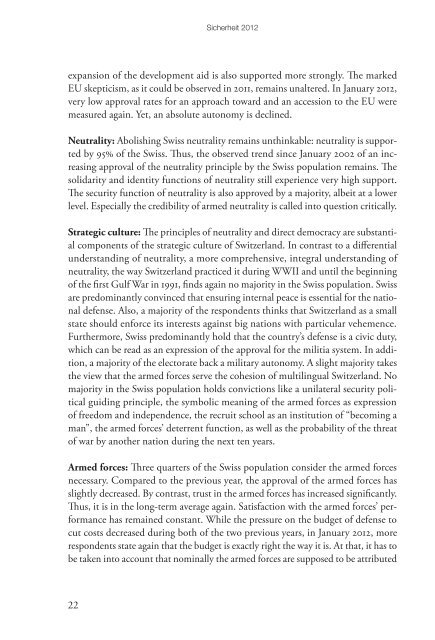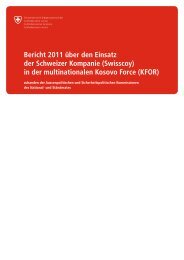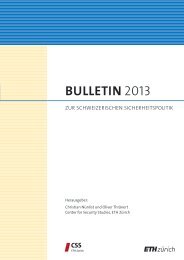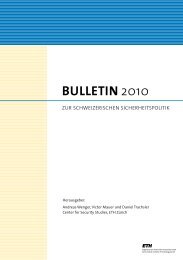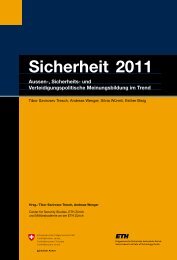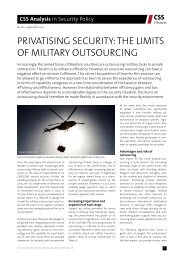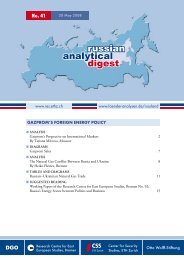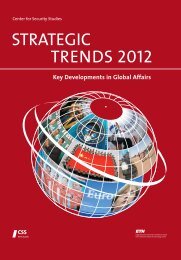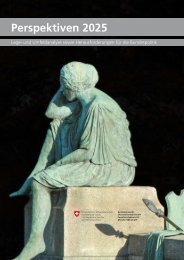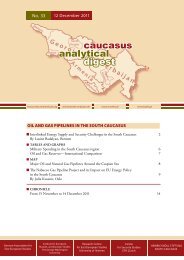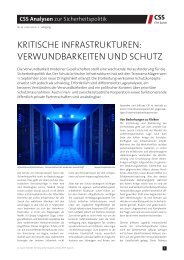Sicherheit 2012 - Center for Security Studies (CSS) - ETH Zürich
Sicherheit 2012 - Center for Security Studies (CSS) - ETH Zürich
Sicherheit 2012 - Center for Security Studies (CSS) - ETH Zürich
Sie wollen auch ein ePaper? Erhöhen Sie die Reichweite Ihrer Titel.
YUMPU macht aus Druck-PDFs automatisch weboptimierte ePaper, die Google liebt.
<strong>Sicherheit</strong> <strong>2012</strong><br />
expansion of the development aid is also supported more strongly. The marked<br />
EU skepticism, as it could be observed in 2011, remains unaltered. In January <strong>2012</strong>,<br />
very low approval rates <strong>for</strong> an approach toward and an accession to the EU were<br />
measured again. Yet, an absolute autonomy is declined.<br />
Neutrality: Abolishing Swiss neutrality remains unthinkable: neutrality is supported<br />
by 95% of the Swiss. Thus, the observed trend since January 2002 of an increasing<br />
approval of the neutrality principle by the Swiss population remains. The<br />
solidarity and identity functions of neutrality still experience very high support.<br />
The security function of neutrality is also approved by a majority, albeit at a lower<br />
level. Especially the credibility of armed neutrality is called into question critically.<br />
Strategic culture: The principles of neutrality and direct democracy are substantial<br />
components of the strategic culture of Switzerland. In contrast to a differential<br />
understanding of neutrality, a more comprehensive, integral understanding of<br />
neutrality, the way Switzerland practiced it during WWII and until the beginning<br />
of the first Gulf War in 1991, finds again no majority in the Swiss population. Swiss<br />
are predominantly convinced that ensuring internal peace is essential <strong>for</strong> the national<br />
defense. Also, a majority of the respondents thinks that Switzerland as a small<br />
state should en<strong>for</strong>ce its interests against big nations with particular vehemence.<br />
Furthermore, Swiss predominantly hold that the country’s defense is a civic duty,<br />
which can be read as an expression of the approval <strong>for</strong> the militia system. In addition,<br />
a majority of the electorate back a military autonomy. A slight majority takes<br />
the view that the armed <strong>for</strong>ces serve the cohesion of multilingual Switzerland. No<br />
majority in the Swiss population holds convictions like a unilateral security political<br />
guiding principle, the symbolic meaning of the armed <strong>for</strong>ces as expression<br />
of freedom and independence, the recruit school as an institution of “becoming a<br />
man”, the armed <strong>for</strong>ces’ deterrent function, as well as the probability of the threat<br />
of war by another nation during the next ten years.<br />
Armed <strong>for</strong>ces: Three quarters of the Swiss population consider the armed <strong>for</strong>ces<br />
necessary. Compared to the previous year, the approval of the armed <strong>for</strong>ces has<br />
slightly decreased. By contrast, trust in the armed <strong>for</strong>ces has increased significantly.<br />
Thus, it is in the long-term average again. Satisfaction with the armed <strong>for</strong>ces’ per<strong>for</strong>mance<br />
has remained constant. While the pressure on the budget of defense to<br />
cut costs decreased during both of the two previous years, in January <strong>2012</strong>, more<br />
respondents state again that the budget is exactly right the way it is. At that, it has to<br />
be taken into account that nominally the armed <strong>for</strong>ces are supposed to be attributed<br />
22


